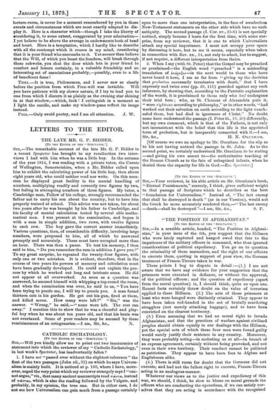CATHOLIC ESCHATOLOGY.
[TO THE EDITOR OF THE " SPECTATOR."] SIR,—Will you kindly allow me to point out two inaccuracies of statement into which the reviewer of my " Catholic Eschatology," in last week's Spectator, has inadvertently fallen ?
1. I have not "passed over without the slightest reference " the first of the two passages (John xii., 32) on which he says Univers- alism is mainly built. It is noticed at p. 160, where I have, more- over, urged the very point which my reviewer strangely says I" can- not argue," viz., that many ancient manuscripts read Ircivra, instead of a-4mq, which is also the reading followed by the Vulgate, and probably, in my opinion, the true one. But in either case, I do not see how Universalism can gain much from a passage certainly open to more than one interpretation, in the face of numberless New-Testament statements on the other side which have no such antiquity. The second passage (I. Cor. xv., 25-6) is not specially noticed, simply because I learn for the first time, with some sur- prise, from my reviewer, that it is one to which Universalists attach any special importance. I must not occupy your space by discussing it here, but to me it seems, especially when taken in connection with Rev. xx., 14, not only to admit, but to suggest, if not require, a different interpretation from theirs.
2. When I say (with St. Peter) that the Gospel may be preached or proclaimed—the English word " preached " is a misleading translation of ixievEEm—in the next world to those who have never heard it here, I am so far from " giving up the doctrine that probation necessarily terminates with death," that I have expressly and twice over (pp. 49, 111) guarded against any such inference, by showing that, according to the Patristic explanation of the words, it is proclaimed to those only who had undergone their trial here ; who, as St. Clement of Alexandria puts it, " were righteous according to philosophy," or in other words, "had worked out their salvation on earth according to the light vouch- safed them, but had died in ignorance of Christ." No doubt some have understood the passage (I. Peter iii., 19, 20) differently, but my own comment, which is that of the Fathers, is not only not inconsistent with the belief that this life is the appointed term of probation, but is inseparably connected with it.—I am, [Of course we owe an apology to Mr. Oxenham for the slip as to his not having noticed the passage in St. John. As to the second point, we certainly understood Mr. Oxenham to be stating —and giving his own assent to—the authoritative teaching of the Roman Church as to the fate of unbaptised infants, when he denied them the capacity for life in God.—En. Spectator.]






































 Previous page
Previous page